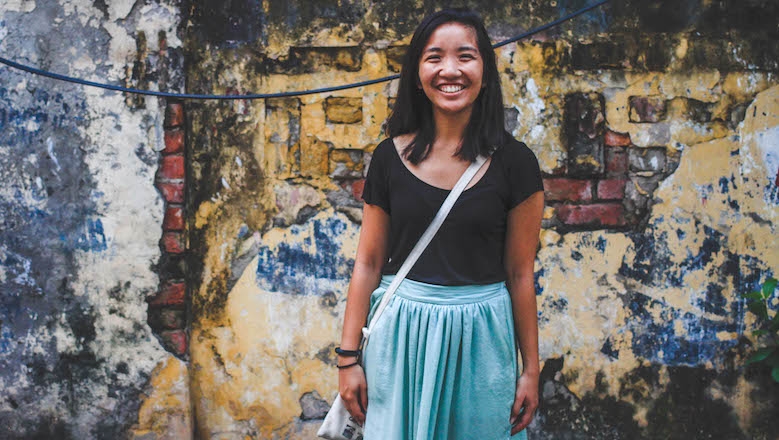Georgetown Alumna Conducts C-Section Research as Fulbright Grantee
I have Georgetown’s Jesuit and globally minded education to thank for my post-college pursuits. . . . The international health major prepared me so well for this Fulbright, laying down the foundations of quantitative and qualitative research methods and providing the unique opportunity as an undergraduate to apply them to multi-faceted global health issues in a capstone project.
February 22, 2019 – Thu Dao (NHS’17), who majored in international health (now called global health) at the School of Nursing & Health Studies, was selected for a grant through the Fulbright U.S. Student Program to conduct research on C-section rates in Vietnam.
She says, “I have Georgetown’s Jesuit and globally minded education to thank for my post-college pursuits. . . . The international health major prepared me so well for this Fulbright, laying down the foundations of quantitative and qualitative research methods and providing the unique opportunity as an undergraduate to apply them to multi-faceted global health issues in a capstone project.”
Question: Tell us about what you are working on through the Fulbright U.S. Student Program grant.
Dao: Based in Hanoi, I am researching the sociocultural and economic influences on the rising rate of non-medically necessary cesarean sections in urban centers in Vietnam through surveys and in-depth interviews with key stakeholders. Given the health consequences of unnecessary C-sections and its financial burden on the health system, I want to better understand how rapid development, local cultures/health beliefs, and globalism may interact and contribute to this concerning trend.
Question: How did you conceptualize this idea?
Dao: My research idea was directly inspired by the research I conducted my senior year in Chiapas, Mexico through the International Health Program’s practicum abroad. Similar to my current project, I researched the factors that affected the disproportionately high and rising rates of C-section through a mixed-method study. After this experience, I fell in love with research and became more curious about the global cesarean trend, especially in other cultural and sociodemographic contexts around the world.
Question: How did you enjoy Georgetown and the international health major?
Dao: I have Georgetown’s Jesuit and globally minded education to thank for my post-college pursuits. In particular, cura personalis taught me solidarity, which means caring about not only physical or mental needs of people, but embracing the fullness of their humanity. I try to apply this holistic mentality to my research, especially in interviews, to understand the entirety of someone’s life story and circumstances. The international health major prepared me so well for this Fulbright, laying down the foundations of quantitative and qualitative research methods and providing the unique opportunity as an undergraduate to apply them to multi-faceted global health issues in a capstone project.
Question: What did you focus on for your senior-level research practicum abroad at Georgetown?
Dao: I had the opportunity of working at El Colegio de la Frontera Sur (ECOSUR) in Chiapas, Mexico for my practicum abroad studying C-sections decision-making. This was actually where I first became interested in maternal health research, especially given the unique context where there is simultaneously a prevalence of home births with traditional midwives and highly medicalized births in the formal health care system. From interviews, I began to see how faulty health policies and overloaded health care systems as well as frictions between tradition and modernity among indigenous women merged to encourage unnecessary C-sections.
Question: Why did you decide to apply for a Fulbright grant?
Dao: One of my professors once said, “We’re swimming in data – you just have to look critically to see it.” This statement fundamentally altered the lens through which I viewed the world: from passive absorber to probing researcher. With every conversation I’ve shared in my travels, I am learning to weave people’s rich stories into the fabric that is our global structures, built by overarching policies, culture, and histories.
My senior-year practicum abroad was my first opportunity to formally actualize this process of connecting conceptual theory to real-life data and personal accounts. From the fieldwork to hours poring over transcripts to systematic coding and analysis, this was one of the most enthralling and intellectually enriching projects I’ve ever completed. After that taste of field research and a bite from the travel bug, applying to Fulbright felt like a natural next step to further explore this newly-found passion for research.
Question: What are your future plans?
Dao: I am applying to medical school this year with hopes of pursuing a joint degree program for a master’s in public health or medical anthropology. My aspiration is to become a primary care physician, and I know that researching and deeply understanding social/structural determinants of health, as well as cultural humility in health care, are critical to providing the best care for the community.

